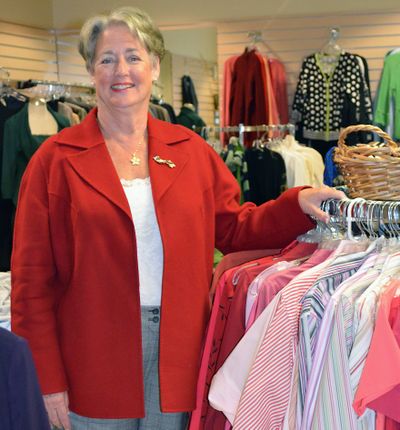YWCA continues to perfect its message
Executive director aims to empower women every day

Trish McFarland finds that the most meaningful days of her work as executive director of the YWCA in Spokane are when she shares stories with other women.
The most frustrating days have been those spent wondering how state budget cuts may affect the YWCA- Spokane’s budget, on top of federal and city cuts to the YWCA’s primary program, Alternatives to Domestic Violence.
YWCA helps 15,000 women a year, including 7,000 calls a year to its emergency crisis line. Women fleeing domestic violence have come from as far away as Florida to escape the danger, said McFarland, who has been the Spokane director since 2009.
The YWCA’s primary goal is to empower women.
One way women are disempowered is through domestic violence, which, she said, “continues to be an issue in good times and bad,” affecting people of all social and economic levels.
In Washington, about 1 in 4 people are affected by domestic violence. Most of them are women.
“We need to continue to battle it,” McFarland said.
Domestic violence can be cyclical: As children see their parents hit or being hit, they think it’s the normal way to show love, McFarland said.
According to a law enforcement report, 38 women in Spokane County have been killed in the past 13 years as a result of domestic violence; one man committed suicide after killing his wife.
“More than half of them met in high school, forming an unhealthy relationship at an early age,” she said. “That’s why we need to reach young people to help them understand appropriate ways to relate.”
Women in the YWCA’s Domestic Violence Awareness program are not uneducated, helpless women. Some are lawyers and doctors.
McFarland explained that domestic violence is often about control issues in the home. It can develop subtly, slowly and insidiously.
“The women had no idea they were being controlled or that the control was domestic violence,” McFarland said.
McFarland said victimizers will isolate women from family, deprive them of access to cash or credit cards and tell them they are not capable of finding a job or doing anything.
“When a woman comes to us, the first thing is that she is safe and creates a safety plan,” McFarland said.
The YWCA’s safe shelter has space for 40 women, but if it’s full, women are taken to a hotel or motel.
“We never turn anyone away,” she said, adding that police and cab drivers know where to take women seeking help. They drive around so no one follows.
The 24-hour crisis line at (509) 325-2255 always has a person available.
“Women who seek help may choose to go back – especially if they did not bring their children or a pet. They may love the man,” McFarland said. “It’s not our place to tell a woman to leave. She’s been living with someone who has been telling her she can do this and can’t do that. … A woman needs to make her own decision. Often, a woman comes back four to five times before leaving. We do not judge that.”
Women can stay at the safe shelter 60 to 90 days. Then the program helps them move into transitional living, helping with rent.
Women go through the YWCA’s Women’s Opportunity Center to build their job readiness with computer classes, budgeting and training for job searches and interviews. They are given a secure email account, and learn about cyber security and cyber stalking.
The center helps women look at their strengths to plan their lives.
Recently, five women found jobs in one week.
“There is turnover,” McFarland said. “Their success is an indicator that the economy is improving.”
The YWCA recently started the Child Advocate Program, headed by Shawna Hill, for children in the shelter who have seen abuse or been abused.
“She works with them one-to-one to address their fear,” McFarland said. “Studies show that complex trauma begins when children see their mother hurt, their dog threatened, or they are hurt. It stops their development and learning.”
Hill helps children create a safety plan for themselves, so if they feel afraid, they know whom to call or what neighbor they can go to.
McFarland, who started working at the YWCA in 2006 and plans to retire at the end this year, said Spokane is a community where people can make a difference.
“People understand when change is needed and step up when people suffer,” she said, referring to the effort to build the collaborative YMCA-YWCA at 930 N. Monroe St., completed in 2009.
Since moving into the new, more visible building, she said requests for services have risen 21 percent.
McFarland considers YWCA staff heroes.
“It’s important for the community to remember to advocate for those who do not have as much,” she said.